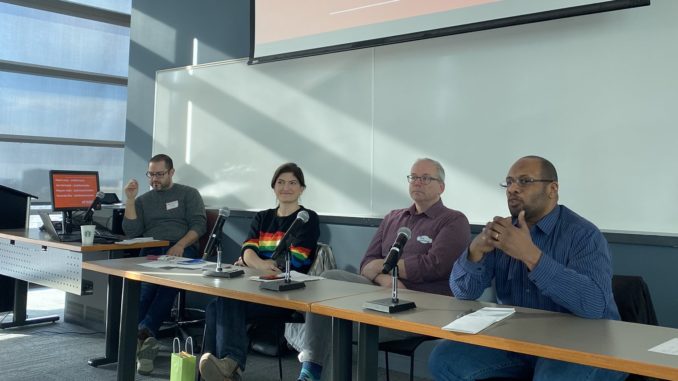
Whether you were able to join us in Chicago or are just looking for some investigative inspiration, here’s a collection of our favorite lessons learned and resources shared so far at this year’s conference.
Something missing? Tweet yours it to us @headlineclub.
QUOTES
We heard a lot of inspiring things at FOIAFest this year. Here are a selection of our favorites.
“The basic function of the Freedom of Information Act (FOIA) is to ensure informed citizens, vital to the functioning of a democratic society.”
“Radical transparency, rigor, trust, professionalism and generosity are essential to large collaborative journalism projects.” (Mago Torres)
“Whenever I hear the words ‘contract modifications’ I’m like ‘That’s it! I know there’s going to be a story here somewhere.’”(Alejandra Cancino)
“If you have a tickle in your gut, follow it and see what happens… Dare them to turn you down, sometimes you can turn that into a story.” (Dave McKinney)
“If you’re reporting about inequality, you can find stories just about anywhere … Geography helps journalists identify inequality in an important way,” (Alden Loury)
TOP TIPS
- Learn about forms that exist and ask for them by their specific names
- When you meet obstacles like huge fees or resistance from officials, make note of it in the story.
- Make sure your FOIA request is explicit, specific and sent to the right person.
- Ask for records electronically and in a sortable format, and know there is a deadline for a response
- When you ask for datasets always ask for accompanying data dictionaries or code sheets so you can read the data
- File a FOIA every day to start learning how your government works and build a pipeline of stories
- Make repeat request(s) with minor tweaks after rejection of first FOIA, or try other agencies
- BUT filing going over 7 FOIAs per week could get you out on a nuisance filer list, so be mindful
NO FOIA FOMO — SEE SESSIONS HERE
Did you miss a session or not get a ticket to FOIAFest this year? Some of the presentations are available online.
STORIES
Looking for inspiration or to see some of the great investigative work discussed at this year’s FOIAFest? Check out any of the links below.
“The Quiet Rooms”: Chicago Tribune and ProPublica investigation into the widespread use of restraint and isolation in Illinois. They compiled mismatching records from over 100 schools to build a database of over 30,000 incidents.
Pilsen schools hollow out as neighborhood gentrifies
RESOURCES
Here are some links to online resources mentioned in panels at FOIAFest 2020.
Borderless Magazine’s Guide to Telling Better (and More Ethical) Immigration Stories
Broadcastify – Records scanner traffic
Chicago.gov – Where to file a FOIA request in Chicago (via @JaredRutecki)
Citizens Police Data Project – Searchable database of police disciplinary records
FOIA.gov – File a federal FOIA request (via @JaredRutecki)
FOIA Language For Requesting Records From The Chicago Police Department (via @dhensleychicago)
GovBook by Chicago Reporter has FOIA contacts for every government unit in Illinois (via @eads)
Guide to writing FOIA requests to the Chicago Police Department
Illinois Traffic Stop Study – Record of all traffic and pedestrian stops by law enforcement agencies in IL (via @advocacycenter1)
Journalists’ Toolbox – Public records resources from SPJ (via @journtoolbox)
Metalicious – Open source data dictionary that tracks other databases’ metadata/schema (via @foiachap)
OneNote – Use to organize information for big projects. When you copy and paste info from online, it retains the URL. (via @mdoukmas)
Post-conviction handbook from City Bureau
Streak– Gmail plugin that can help sort emails, send read receipts so you can follow up (via @mdoukmas)

